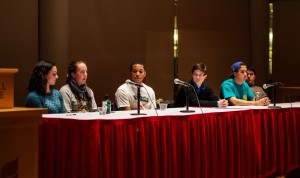By Stephen Gruber-Miller
grubermi@grinnell.edu
This week, in addition to Pride Week, Grinnell celebrated the second annual NCAA Division III Week with a former major league baseball umpire guest speaker, a student-athlete diversity panel and a poster campaign.
The first Division III Week was in 2012 and was created to celebrate athletics and student-athletes.
“Division III Week is a positive opportunity for all individuals associated with a Division III institution to observe and celebrate the impact of athletics,” said Pioneer Diversity Council (PDC) adviser Taunita Stephenson, quoting an NCAA press release.
The College celebrated D-III Week last year, but wanted to expand their events this year. Stephenson was the head organizer for the week, helped by PDC and the Student Athletic Advisory Committee (SAAC).
“This year, we wanted the week to be more encompassing,” Stephenson said.
As part of both D-III Week and Pride Week, PDC invited Dave Pallone to speak on campus. Pallone is a former MLB umpire, the third youngest in baseball history. He was fired after ten years with the National Baseball League when it was revealed that he is gay.
Currently, Pallone is a public speaker who gives talks about the reality of understanding sexual orientation. His talk on Wednesday was partly autobiographical in nature, telling the story of his exclusion from the world of baseball and the isolation of being forced to keep his sexuality a secret from friends and family.
Ultimately, Pallone encouraged an environment where friends and teammates would feel safe and comfortable coming out. Respect is the most important thing to him.
“Respect makes everything simple,” Pallone said. “It’s colorblind. It’s gender-blind. It’s orientation-blind.”
Pallone believes that the NCAA has done a good job over the last three decades educating athletes and promoting an attitude of acceptance, but he says that the world of sports, especially professional sports, has a long way to go on the path to inclusion.
“I hope that [the talk] at least started some dialogue within the Grinnell athletic community about making the Grinnell sports teams more LGBTQ-friendly, something I think sometimes gets overlooked at a place like here,” said SAAC Chair of Community Service Karen Gogins ’13

Photo by John Brady
The diversity dialogue panel on Thursday night also featured the topic of inclusion. It featured six student-athlete panelists from diverse backgrounds: Kathryn Vincent ’13 of women’s soccer, Brendan Ramirez ’16 of football, Eddie Guen-Murray ’15 of football, Grace Ryan ’14 of softball, Claire Williams ’13 of women’s swimming and Ben Vaughn ’15 of men’s swimming.
The panelists were asked to share experiences in which they felt either included or excluded at some point in their lives. They emphasized many ways that Grinnell has included them: through nicknames and traditions among their teams, support from professors and students and the fact that Grinnell is such a safe space.
Another purpose of the week was to fight misconceptions about student-athletes. SAAC organized a poster campaign called Unique You and put up little-known facts about student athletes that showcase their diversity.
“It is meant to be a fun way to learn fun facts about Pioneer athletes and help fight misconceptions about athletes at Grinnell,” Gogins said about the posters.
Facts on the posters ranged from “Did you know that one Grinnell student-athlete is a two-time national champion and has received multiple national top ten honors on the Arabian horse show circuit?” to “Did you know that one Grinnell student-athlete appeared on Sesame Street 8 times as a young actor?”
The focus of Division III schools on having true student-athletes is something that means a lot to the organizers of D-III Week. Athletic scholarships are not offered at Division III schools, so students can be competitive in athletics while still putting classes first.
“I’m extremely proud to be a student-athlete,” said Aamir Walton ’15. He explained that it is a special thing to be able to share a bond with teammates both on the field and the next day in the classroom.
“What makes D-III different from D-I and D-II is that, while student-athletes at the D-III level really appreciate the athletic experience and they want to compete on a pretty highly competitive level, they appreciate the total experience of college,” Stephenson said.




















































